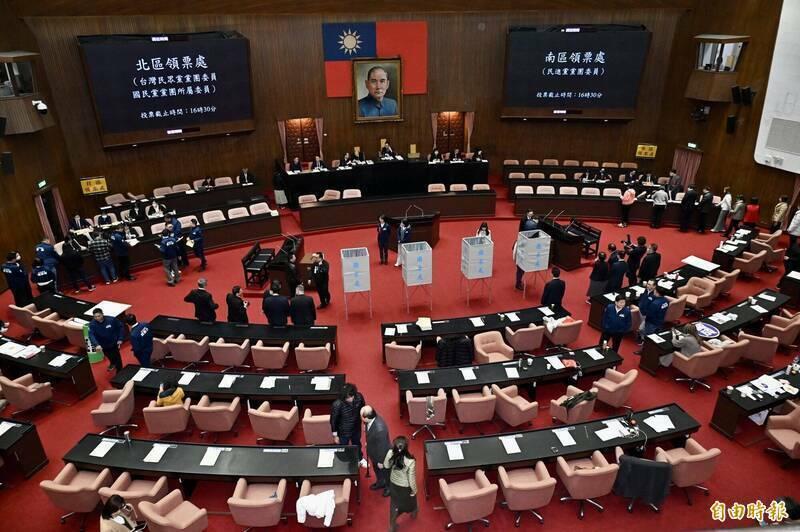The legislature today voted against a motion to reconsider a Constitutional Court Act amendment bill by 62 to 51 votes after it was sent back by the Executive Yuan last week.
Democratic Progressive Party (DPP) caucus chief executive Rosalia Wu (吳思瑤) later said the party is to seek an injunction to halt the bill’s enactment and request a Constitutional interpretation.
Deputy Legislative Speaker Johnny Chiang (江啟臣) announced the result of the vote this afternoon, with 62 voting against reconsidering the bill and 51 voting in favor of reconsidering the bill. There were no invalid votes.

Photo: Tu Chien-jung, Taipei Times
The Chinese Nationalist Party (KMT), with the support of two independent lawmakers, holds 54 seats in the 113-seat legislature, while the Taiwan People’s Party (TPP) holds 8 seats. The ruling DPP holds 51 seats.
President William Lai (賴清德) is to evaluate all remedy options that are legal and constitutional in order to protect people’s rights, Presidential Office spokesperson Karen Kuo (郭雅慧) said.
The opposition parties had proposed that Premier Cho Jung-tai (卓榮泰) not be invited to give a report on the law to the legislature during the Committee of the Whole Yuan earlier today. The motion passed with 60 to 51 votes.
The legislature later convened the Committee of the Whole Yuan, during which the opposition lawmakers said the amendments would make legal procedures more stringent, bringing Taiwan closer to Western democratic countries.
DPP Legislator Tsai Yi-yu (蔡易餘) said the amendment, which is unconstitutional in itself, would make the Constitutional Court the most “regressive” one in history.
The Executive Yuan regrets that the legislature conducted the vote in the absence of Premier Cho, Cabinet spokesperson Michelle Lee (李慧芝) said today.
The vote came after the Executive Yuan last week submitted a formal request to the Legislative Yuan to reconsider the bill, which passed its third reading on Dec. 20.
The amendments to the Constitutional Court Procedure Act (憲法訴訟法) stipulate that at least 10 grand justices need to be present to hear a case, while nine would be needed to back a ruling of unconstitutionality.
The Constitutional Court usually has 15 justices but currently only has eight justices after seven completed their terms on Oct. 31 last year with the vacancies yet to be filled.
The previous regulations did not stipulate a minimum number of justices required to hear a case, requiring instead at least two-thirds of justices, with rulings determined by a majority vote.
The number of justices can fluctuate due to terms expiring or other events and the time it takes to replace them.
The acting president of the Judicial Yuan Shieh Ming-yan (謝銘洋) today said amendments to the act would “create problems” for the operation of the Constitutional Court.
The Executive Yuan is to consult scholars and experts to decide on the next steps to maintain the normal operation of the constitution system, Lee said.
Additional reporting by Chung Li-hua, Shih Hsiao-kuang and Lery Hiciano

An essay competition jointly organized by a local writing society and a publisher affiliated with the Chinese Communist Party (CCP) might have contravened the Act Governing Relations Between the People of the Taiwan Area and the Mainland Area (臺灣地區與大陸地區人民關係條例), the Mainland Affairs Council (MAC) said on Thursday. “In this case, the partner organization is clearly an agency under the CCP’s Fujian Provincial Committee,” MAC Deputy Minister and spokesperson Liang Wen-chieh (梁文傑) said at a news briefing in Taipei. “It also involves bringing Taiwanese students to China with all-expenses-paid arrangements to attend award ceremonies and camps,” Liang said. Those two “characteristics” are typically sufficient

A magnitude 5.9 earthquake that struck about 33km off the coast of Hualien City was the "main shock" in a series of quakes in the area, with aftershocks expected over the next three days, the Central Weather Administration (CWA) said yesterday. Prior to the magnitude 5.9 quake shaking most of Taiwan at 6:53pm yesterday, six other earthquakes stronger than a magnitude of 4, starting with a magnitude 5.5 quake at 6:09pm, occurred in the area. CWA Seismological Center Director Wu Chien-fu (吳健富) confirmed that the quakes were all part of the same series and that the magnitude 5.5 temblor was

The brilliant blue waters, thick foliage and bucolic atmosphere on this seemingly idyllic archipelago deep in the Pacific Ocean belie the key role it now plays in a titanic geopolitical struggle. Palau is again on the front line as China, and the US and its allies prepare their forces in an intensifying contest for control over the Asia-Pacific region. The democratic nation of just 17,000 people hosts US-controlled airstrips and soon-to-be-completed radar installations that the US military describes as “critical” to monitoring vast swathes of water and airspace. It is also a key piece of the second island chain, a string of

The Central Weather Administration has issued a heat alert for southeastern Taiwan, warning of temperatures as high as 36°C today, while alerting some coastal areas of strong winds later in the day. Kaohsiung’s Neimen District (內門) and Pingtung County’s Neipu Township (內埔) are under an orange heat alert, which warns of temperatures as high as 36°C for three consecutive days, the CWA said, citing southwest winds. The heat would also extend to Tainan’s Nansi (楠西) and Yujing (玉井) districts, as well as Pingtung’s Gaoshu (高樹), Yanpu (鹽埔) and Majia (瑪家) townships, it said, forecasting highs of up to 36°C in those areas